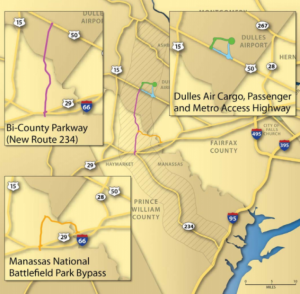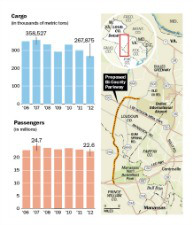 A new route through some of Prince William County’s rural north is pitched as pro-business and part of the area’s transportation solution, but critics have lined up to push back on a new run of pavement through a part of the region happy to be away from gridlock.
A new route through some of Prince William County’s rural north is pitched as pro-business and part of the area’s transportation solution, but critics have lined up to push back on a new run of pavement through a part of the region happy to be away from gridlock.
The Commonwealth Transportation Board recently approved a master-plan study for what’s become known as the “Bi-County Parkway,” a 10-mile road that would connect I-66 in Prince William County with Route 50 in Loudon County.
“This parkway would make people’s lives better,” said Bob Chase, president of the Northern Virginia Transportation Alliance. “It provides faster, safer transportation, and takes people off local roads.”
The road’s purpose is to ease the horrendous traffic that currently plagues the area, while also providing easier access to the Washington Dulles International Airport for residents of these counties. The Virginia Department of Transportation estimates that the road could carry nearly 42,000 vehicles a day by 2020 to combat the area’s exploding population.
“We see this as a vital north-south link for Prince William and Loudon,” Chase said. “It’s a common sense solution that makes employment centers accessible and takes traffic off existing roads.”
The parkway is also seen as an economic boon for the region.
“Not only will the road reduce traffic congestion between the counties, but it will also help the region connect with the airport,” said Leo Schefer, president of the Washington Airports Task Force. “The airport’s an economic engine for the area, and better access to it helps encourage businesses to locate nearby.”
The road also has the potential to benefit the airport itself by increasing the number of passengers and encouraging more cargo to pass through Dulles.
“It would allow for a better flow of passengers and information through the airport, and cargo is a part of that,” said Christopher Paolino, media relations manager for the Metropolitan Washington Airports Authority. “That would be a net positive for everyone, since as the airport grows, the region grows, and vice versa.”
But critics of the parkway are worried that road may harm the nearby Manassas Battlefield and Prince William’s Rural Crescent.
“This road could forever harm the landscape and the acres of historic sites it would cut through,” said Stewart Schwartz, executive director of the Coalition for Smarter Growth. “Residents have real concerns about the damage that this could cause to the community.”
Schwartz’s coalition has worked with other groups in developing a study finding that the parkway will only add traffic to the area, not ease it.
“If you build it, people will try to use it, and that creates congestion,” Schwartz said. “It’s also likely that this will bring pressure from developers to convert the Rural Crescent, and that will bring even more traffic.”
The group has also developed an alternative plan aimed at dispersing traffic by improving the interchange between Route 28 and I-66 and extending Metrorail service to Centreville, avoiding the need for the parkway.
“Our best hope is to improve our existing transit options and to build compact, walkable neighborhoods with public transportation,” Schwartz said.
Some local politicians echo the road rage, particularly Del. Tim Hugo (R-Centreville).
Transportation officials were trying to get the road done quietly, Hugo said. “But people woke up.”
The fight over the road has sent longtime political allies in Prince William County to opposing corners. Hugo argues support for the project is developer-driven.
“This is the wrong project at the wrong time, and the response from the people has been overwhelmingly in opposition,” Hugo said. “This road could create a commuter crisis from Fauquier to Fairfax.”
Proponents argue the goal is to get cars from one end of this rural area to the other, not increasing development within these communities. Shefer said the parkway can include easements around the road and limits on the number of exits to restrict development.
“If it’s designed the right way, then the parkway won’t harm the rural presence, but preserve it,” Schefer said.
Some changes have already been made to resolve some concerns about access and impacts on historical sites. As the project continues to take shape, Schefer and others are hopeful that the final product is controversy-free.
“The key is for everyone to work together, in order to help improve connectivity and save people time,” Schefer said. “There’s no reason this can’t be a win-win for everyone.”
Photo courtesy of VDOT.
Click here to read the original story>>


